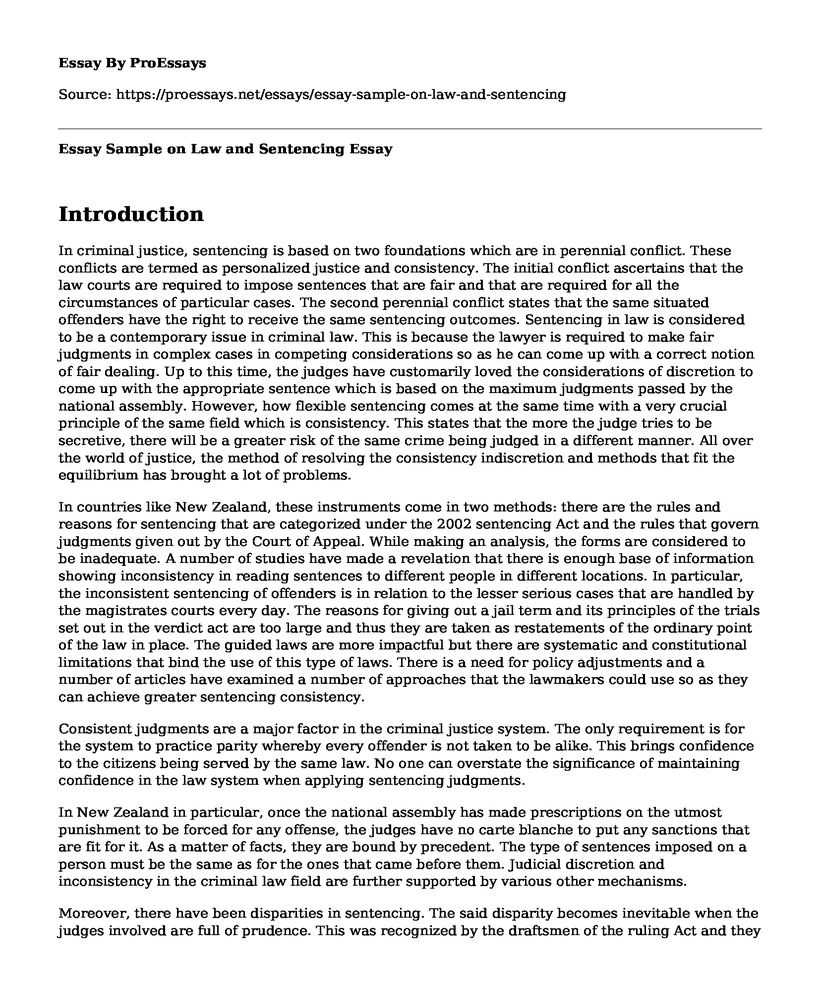Introduction
In criminal justice, sentencing is based on two foundations which are in perennial conflict. These conflicts are termed as personalized justice and consistency. The initial conflict ascertains that the law courts are required to impose sentences that are fair and that are required for all the circumstances of particular cases. The second perennial conflict states that the same situated offenders have the right to receive the same sentencing outcomes. Sentencing in law is considered to be a contemporary issue in criminal law. This is because the lawyer is required to make fair judgments in complex cases in competing considerations so as he can come up with a correct notion of fair dealing. Up to this time, the judges have customarily loved the considerations of discretion to come up with the appropriate sentence which is based on the maximum judgments passed by the national assembly. However, how flexible sentencing comes at the same time with a very crucial principle of the same field which is consistency. This states that the more the judge tries to be secretive, there will be a greater risk of the same crime being judged in a different manner. All over the world of justice, the method of resolving the consistency indiscretion and methods that fit the equilibrium has brought a lot of problems.
In countries like New Zealand, these instruments come in two methods: there are the rules and reasons for sentencing that are categorized under the 2002 sentencing Act and the rules that govern judgments given out by the Court of Appeal. While making an analysis, the forms are considered to be inadequate. A number of studies have made a revelation that there is enough base of information showing inconsistency in reading sentences to different people in different locations. In particular, the inconsistent sentencing of offenders is in relation to the lesser serious cases that are handled by the magistrates courts every day. The reasons for giving out a jail term and its principles of the trials set out in the verdict act are too large and thus they are taken as restatements of the ordinary point of the law in place. The guided laws are more impactful but there are systematic and constitutional limitations that bind the use of this type of laws. There is a need for policy adjustments and a number of articles have examined a number of approaches that the lawmakers could use so as they can achieve greater sentencing consistency.
Consistent judgments are a major factor in the criminal justice system. The only requirement is for the system to practice parity whereby every offender is not taken to be alike. This brings confidence to the citizens being served by the same law. No one can overstate the significance of maintaining confidence in the law system when applying sentencing judgments.
In New Zealand in particular, once the national assembly has made prescriptions on the utmost punishment to be forced for any offense, the judges have no carte blanche to put any sanctions that are fit for it. As a matter of facts, they are bound by precedent. The type of sentences imposed on a person must be the same as for the ones that came before them. Judicial discretion and inconsistency in the criminal law field are further supported by various other mechanisms.
Moreover, there have been disparities in sentencing. The said disparity becomes inevitable when the judges involved are full of prudence. This was recognized by the draftsmen of the ruling Act and they noted that without evidently set guidelines, there will be an augmented risk of the judges handling the dissimilar sentences for the criminals with the same cases.
Conclusion
Criminal sentencing of offenders is the biggest component of the law system. The difficulty in imposing judgments comes while trying to know what to do with the person accused by an offense formerly found guilty. While basically finding this being difficulty becomes the most basic nervousness between personal integrity and steadiness.
Cite this page
Essay Sample on Law and Sentencing. (2022, Dec 18). Retrieved from https://proessays.net/essays/essay-sample-on-law-and-sentencing
If you are the original author of this essay and no longer wish to have it published on the ProEssays website, please click below to request its removal:
- Paper Example on Legislative Policy: Individual with Disability Education Act
- Compare and Contrast Essay on Punishment vs. Rehabilitation
- Miranda Case Study
- Essay Example on Detective Gi Jong Lee Solves Major Cases in London County, VA
- Essay Example on Smart Borders: Quantum Security Solutions for Situational Awareness
- Essay Example on DDoS Attack: Flooding Systems With Malicious Traffic
- Developing employability skills - personal profile and self-evaluation







